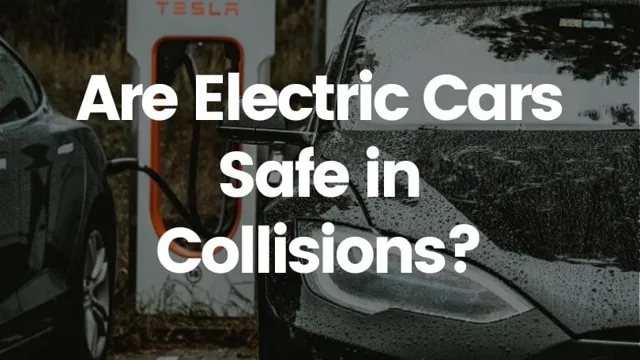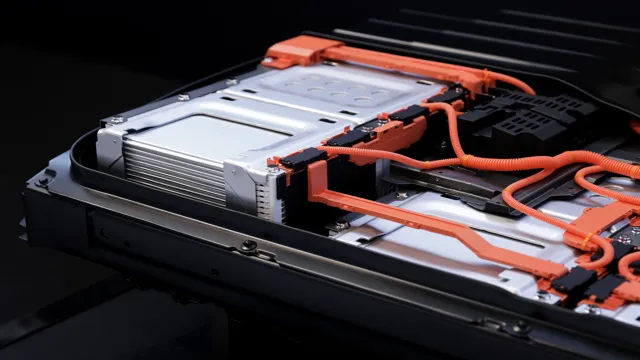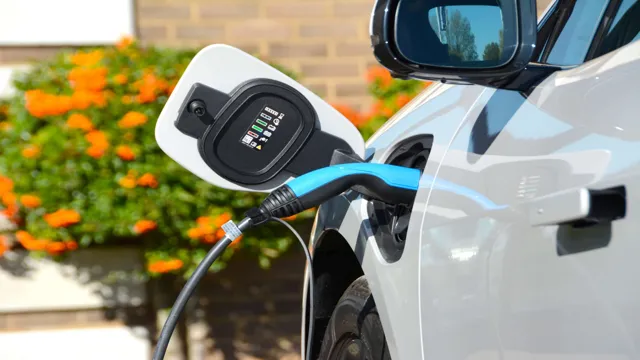Juicing Up Your Ride: Debunking Myths About Electric Vehicle Battery Safety
Electric cars have been touted as the future of personal transportation, with many people singing their praises for being eco-friendly and economical. However, as with any new technology, there are still questions and concerns that need to be addressed. One of the most significant concerns with electric cars is the safety of their batteries.
Are electric car batteries truly safe, or is this just another case of putting people’s lives at risk in the name of progress? In this blog post, we will tackle this issue head-on, exploring the real risks and benefits of electric car batteries and offer insights into the latest advances in battery technology. Stick around to learn more about this crucial issue.
History and Development of Electric Car Batteries
Are the batteries in electric cars safe? It’s a common concern for potential electric car buyers, but the truth is that batteries have come a long way in terms of safety. In the early days of electric cars, battery technology was still quite primitive and there were some high-profile incidents that caused concern. However, over the years, batteries have become much safer, thanks to improvements in design and manufacturing techniques.
Modern electric car batteries are sophisticated systems that are carefully engineered to minimize the risk of fire or explosion. In fact, electric cars have been shown to be no more dangerous than gasoline-powered cars when it comes to vehicle fires. Of course, like any technology, there is always some degree of risk.
However, as long as the battery is maintained properly and the car is used as intended, there should be no cause for concern. So, are the batteries in electric cars safe? The answer is a resounding yes.
How electric car batteries work?
Electric car batteries have come a long way since they were first developed in the early 1800s. While traditional lead-acid batteries were used in early models, modern electric vehicles now utilize advanced lithium-ion batteries, which are much more efficient and have a longer lifespan. The rise of electric cars has been partially fueled by improvements in battery technology, as researchers continue to develop batteries that can go further on a single charge and charge more quickly.
In recent years, solid-state batteries have emerged as a potential game-changer, offering even greater energy density and potentially faster charging times. As the demand for electric cars continues to grow, we can expect to see even more innovation in the field of electric car batteries.

Types of Electric Car Batteries
Electric car batteries have come a long way since their inception. Initially, the lead-acid battery was the primary choice for electric cars, but it had its limitations. As technology advanced, nickel-cadmium batteries were introduced, which were more efficient and long-lasting.
However, they were toxic to the environment and posed a risk of explosion. The introduction of nickel-metal hydride batteries in the 1990s marked a significant shift in electric car battery technology, providing better performance and longer life without harming the environment. Today, the most commonly used electric car batteries are lithium-ion batteries, which are more efficient, lighter, and highly responsive.
They provide improved charging times and longer ranges. With the increasing demand for electric cars, manufacturers are continually working to improve battery technology and reduce costs, making electric cars accessible to the masses.
Safety Features of Electric Car Batteries
Are the batteries in electric cars safe? The short answer is yes, as battery manufacturers have developed a range of safety features to prevent any potential hazards. Lithium-ion batteries, which are commonly used in electric vehicles, are designed to have high energy density with low weight, making them ideal for transportation applications. However, this also makes them more susceptible to thermal runaway, which is when the battery overheats and catches fire.
To prevent this, electric car batteries come with safety features such as thermal management systems that regulate the temperature and prevent overheating. Additionally,safety valves ensure that if the internal pressure of the battery reaches a dangerous level, it will release some of the electrolyte and pressure to prevent explosion. Moreover, modern electric car batteries include sophisticated Battery Management Systems (BMS) that continuously monitor the power levels, temperature, and other vital parameters to ensure a safe and optimal performance of the battery and the car at any time.
All these features are put in place to guarantee the safety of electric cars and, as a result, has helped reduce the number of accidents involving electric vehicle batteries.
What safety measures are in place to prevent accidents?
Electric car batteries have come a long way in terms of safety features, and they are continuously improving. One of the most significant changes is that lithium-ion batteries have replaced older battery technologies, which had a higher risk of overheating. Lithium-ion batteries are much safer because they have built-in heat sensors and cooling systems that help prevent them from overheating.
In addition, electric vehicles come with safety features like electronic stability control, which helps prevent rollover accidents. They also have anti-lock brakes and traction control, which improve their safety on slippery roads. Another safety feature is regenerative braking, which helps recharge the battery while braking.
This feature not only reduces the wear and tear on the brakes and extends their lifespan but also contributes to energy efficiency and makes the vehicle safer. Overall, these safety features make electric vehicles safer than traditional gasoline-powered cars and trucks, contributing to a brighter and greener future for us all.
What happens in case of an accident?
Electric car batteries come with several safety features to prevent accidents and ensure the safety of both passengers and other road users. One of the most important safety features is the battery management system that monitors and controls the batteries’ temperature and voltage. This system ensures that the battery stays within the safe operating range, preventing it from overheating or short-circuiting.
Additionally, electric cars have reinforced battery enclosures that protect the batteries in case of an impact, reducing the risk of explosion or fire. Moreover, electric cars also have safety disconnect systems that can disconnect the battery from the car’s electrical system in case of an accident, preventing further damage or electric shock. These safety features make electric cars much safer than traditional gasoline cars and show that electric car manufacturers prioritize the safety of their customers.
So, if you’re worried about what happens in case of an accident with an electric car, know that electric car batteries are designed with safety in mind and have several safety features to prevent or minimize any damage.
How do electric car batteries compare to gas car fuel tanks?
When it comes to comparing electric car batteries to gas car fuel tanks, one aspect that often comes to mind is safety. And in this regard, electric car batteries have some advantages over traditional fuel tanks. For one, the design of electric car batteries is such that they have a lower risk of catching fire or exploding compared to gas tanks.
This is because electric car batteries are typically built with multiple layers of protection and thermal management systems that keep them cool and limit any potential damage in case of an accident. While gas tanks are also designed with various safety features, the volatile nature of gasoline means that the risk of an explosion or fire is inherently higher. Moreover, electric car batteries are typically located in the floor, providing a lower center of gravity which can improve overall stability and handling.
So if you’re someone who values safety in their vehicle, you may want to consider an electric car with its advanced battery technology.
Battery Recycling and Disposal
If you’re considering buying an electric car, you may be wondering if the batteries inside are safe. The good news is that electric car batteries are designed to be safe and reliable. However, like any other vehicle, they need to be properly maintained and handled.
The lithium-ion batteries used in most electric vehicles are still relatively new technology, and there are some concerns about how they should be disposed of and recycled. While the batteries themselves are not considered hazardous waste, there are regulations in place to ensure that they are handled and transported safely. In addition, many car manufacturers offer programs to help consumers safely dispose of or recycle their old batteries.
Overall, electric car batteries are safe, but it’s important to follow the manufacturer’s recommendations for maintenance and disposal.
Why is battery recycling important?
Battery recycling is becoming increasingly important due to the growing demand for batteries and the environmental impact of disposing of them. As batteries contain toxic chemicals such as lead, mercury, and cadmium, they can pose a threat to the environment if not properly disposed of. Recycling batteries can prevent these chemicals from ending up in landfills or being released into the environment, reducing the risk of pollution and protecting the health of ecosystems and wildlife.
Additionally, recycling batteries can help conserve natural resources by recovering valuable materials that can be reused in the manufacturing process. By properly disposing of batteries, we can ensure that we are doing our part in protecting the environment and promoting sustainability. So, the next time you need to dispose of a battery, consider recycling it instead.
What is the process of recycling electric car batteries?
Electric car batteries are an essential component that provides long-lasting power for electric vehicles. However, like any other battery, they will eventually reach the end of their lifespan. The good news is that these batteries can be recycled, and the process of recycling them involves several steps.
First, the batteries are disassembled, and the electrodes are extracted. Then, these electrodes are crushed to separate various metals such as copper, aluminum, nickel, and cobalt. These metals are then purified and sold to manufacturers that require them.
The recycling process helps reduce the amount of e-waste in landfills, conserves natural resources, and minimizes the need for mining new materials. It also prevents toxic chemicals from leaching into the environment, which can cause harm to wildlife and human health. Therefore, recycling electric car batteries is crucial for sustainability and environmental protection.
Final Verdict on Electric Car Battery Safety
If you’re hesitant about buying an electric car because of battery safety concerns, you can breathe easy. The batteries in electric cars are incredibly safe. These lithium-ion batteries are tested over and over for durability and reliable performance.
In fact, many electric car manufacturers require that their batteries go through rigorous safety and stress tests before they’re cleared to be sold. Additionally, electric car batteries are designed with safety features that prevent them from overheating or igniting, and they’re housed in a protective casing. So, rest assured that the batteries in electric cars are safe and reliable, giving you peace of mind when hitting the road.
Conclusion
In conclusion, the batteries in electric cars are as safe as any other technology that we use in our daily lives. However, it is important to understand that like any other technology, they do come with their own set of risks and precautions. With proper maintenance, use, and handling, electric car batteries can provide a cleaner and safer mode of transportation for all of us.
So, the next time someone asks you, “are the batteries in electric cars safe?” you can confidently reply, “yes, but just like any other technology, use wisely and stay charged!”
FAQs
Why are electric car batteries considered safe?
Electric car batteries are considered safe because they are designed with multiple safety features including thermal management systems, protective enclosures, and advanced electronic controls.
Can electric car batteries catch fire?
While electric car batteries have been known to catch fire, the risk is relatively low compared to gasoline-powered cars. Additionally, most electric cars are equipped with sophisticated fire suppression systems to quickly extinguish any fires that may occur.
What happens to electric car batteries at the end of their life?
At the end of their life, electric car batteries can be recycled or repurposed for use in stationary energy storage applications. This reduces waste and extends the useful life of the batteries.
Do electric car batteries pose a risk to the environment?
While electric car batteries do contain certain hazardous materials, such as lithium-ion, efforts are being made to improve battery recycling processes and reduce environmental impact. Additionally, the use of electric cars reduces greenhouse gas emissions and air pollution, making them a more environmentally friendly alternative to traditional gas-powered cars.




